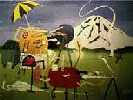
|

CSE 421, Sp '17: Introduction to Algorithms |
|
 CSE Home CSE Home |
 About Us About Us |
 Search Search |
 Contact Info Contact Info |
|
Course Email: cse421a_sp17@uw.edu. Staff announcements and general interest student/staff Q&A about homework, lectures, etc. The instructor and TAs are subscribed to this list. Enrolled students are as well, but probably should change their default subscription options. Messages are automatically archived. Discussion Board: Also feel free to use Catalyst GoPost to discuss homework, etc. Catalog Description: Techniques for design of efficient algorithms. Methods for showing lower bounds on computational complexity. Particular algorithms for sorting, searching, set manipulation, arithmetic, graph problems, pattern matching. Prerequisites: CSE 312; CSE 332 Credits: 3 Grading: Homework, Midterm, Final. Homework will be a mix of paper & pencil exercises and programing. Overall weights 55%, 15%, 30%, roughly. Late Policy: Unless otherwise announced, homework is due at the start of class on the due date. 20% off per day thereafter (business day, e.g., Monday for Friday due dates). Extra Credit: Assignments may include "extra credit" sections. These will enrich your understanding of the material, but at a low points per hour ratio. Do them for the glory, not the points, and don't start extra credit until the basics are complete. Collaboration: Homeworks are all individual, not group, exercises. Discussing them with others is fine, even encouraged, but you must produce your own homework solutions. Follow the "Gilligan's Island Rule": if you discuss the assignment with someone else, don't keep any notes (paper or electronic) from the discussion, then go watch 30+ minutes of TV (Gilligan's Island reruns especially recommended) before you continue work on the homework by yourself. You may not look at other people's written solutions to these problems, not in your friends' notes, not in the dorm files, not on the internet, ever. If in any doubt about whether your activities cross allowable boundaries, tell us before, not after, you turn in your assignment. See also the UW CSE Academic Misconduct Policy, and the links there. Textbook: Algorithm Design by Jon Kleinberg and Eva Tardos. Addison Wesley, 2006. (Available from U Book Store, Amazon, etc.) Portions of the CSE 421 Web may be reprinted or adapted for academic nonprofit purposes, providing the source is accurately quoted and duly credited. The CSE 421 Web: © 1993-2017, the Authors and the Department of Computer Science and Engineering, University of Washington. |
||||||||||||||||||||||||||||||||||||||||||||||||||||||||||||||||||||||||||||||||||||||||||||||||||||||||||||||||||||||||||||||||||||||||||||||||||||||||||||||||||||||||||||||||||||||||||||||||||||||
|
Computer Science & Engineering University of Washington Box 352350 Seattle, WA 98195-2350 (206) 543-1695 voice, (206) 543-2969 FAX | |